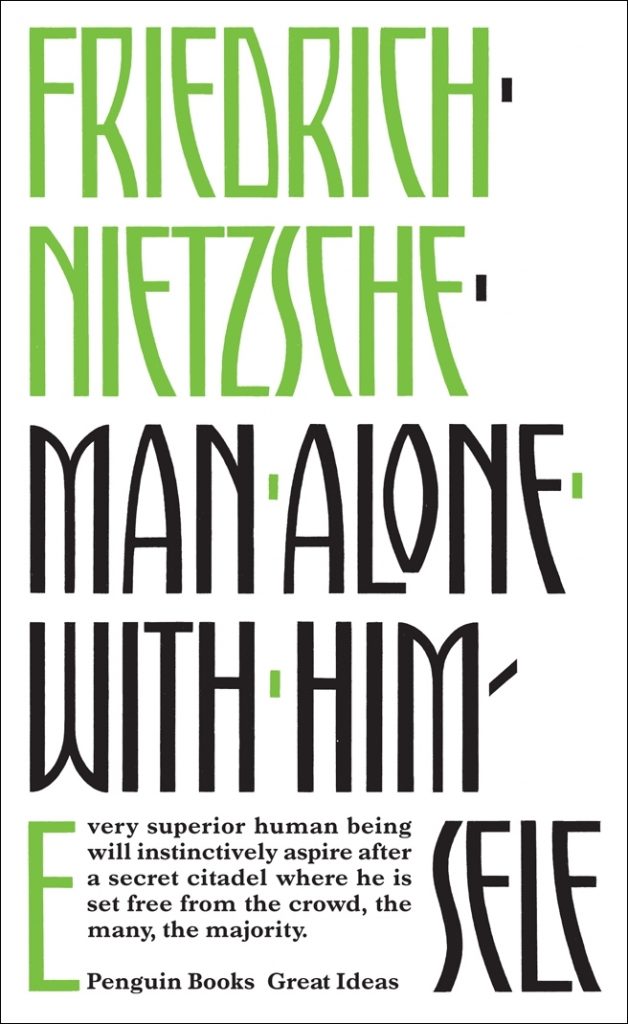
Nietzsche once said “It is my ambition to say in ten sentences what others say in a whole book.” Here is an example of him doing just that. Setting out his views in a series of aphorisms on truth, passion, and morality and much more.
Who is this book for? People interested in Nietzsche looking for a light read to take some time and reflect. Similar the Meditations by Marcus Aurelius it’s the sort of book you can pick up on a Sunday afternoon read a few pages and have a think about existance. It’s not the sort of book that you could just listen to on an audiobook, it requires some digestion and rereading. Below I have selected some of my favourite quotes.
1 Enemies of truth. Convictions are more dangerous enemies of truth than lies.
13 The infuriating thing about an individual way of living. People are always angry at anyone who chooses very individual standards for his life; because of the extraordinary treatment which that man grants to himself, they feel degraded, like ordinary beings.”
16 Condition for being a hero. If a man wants to become a hero, the snake must first become a dragon: otherwise he is lacking his proper enemy.
18 Using high and low tides. For the purpose of knowledge, one must know how to use that inner current that draws us to a thing, and then the one that, after a time, draws us away from it.
19 Delight in oneself. ‘Delight in an enterprise,’ they say; but in truth it is delight in oneself, by means of an enterprise.
26 Out in nature. We like to be out in nature so much because it has no opinion about us.
38 Danger of our culture. We belong to a time in which culture is in danger of being destroyed by the means of culture.
49 The life of the enemy. Whoever lives for the sake of combating an enemy has an interest in the enemy’s staying alive.
65 The ‘witty’ ones. The man who seeks wit has no wit.
90 Origin of courage. The ordinary man is courageous and invulnerable like a hero when he does not see the danger, when he has no eyes for it. Conversely, the hero’s one vulnerable spot is on his back; that is, where he has no eyes.
132 Backward and anticipating people. The unpleasant personality who is full of mistrust, who reacts with envy to his competitors’ and neighbors’ successes, who flares up violently at divergent opinions, is showing that he belongs to an earlier stage of culture, and is thus a relic. For the way in which he interacts with people was proper and appropriate for the conditions of an age when rule by force prevailed: he is a backward person. A second personality, who shares profusely in others’ joy, who wins friends everywhere, who is touched by everything that grows and evolves, who enjoys other people’s honors and successes, and makes no claim to the privilege of alone knowing the truth, but instead is full of modest skepticism – he is an anticipator who is reaching ahead towards a higher human culture. The unpleasant personality grows out of times when the unhewn foundation of human intercourse had still to be laid; the other lives on its highest floors, as far away as possible from the wild animal that rages and howls locked up in the cellars, beneath the foundations of culture.
137 In the fire of contempt. It is a new step towards independence, once a man dares to express opinions that bring disgrace on him if he entertains them; then even his friends and acquaintances begin to grow anxious. The man of talent must pass through this fire, too; afterwards he is much more his own person.
143 Solitary people. Some people are so used to solitude with themselves that they never compare themselves to others, but spin forth their monologue of a life in a calm, joyous mood, holding good conversations with themselves, even laughing. But if they are made to compare themselves with others, they tend to a brooding underestimation of their selves: so that they have to be forced to learn again from others to have a good, fair opinion of themselves. And even from this learned opinion they will always want to detract or reduce something. Thus one must grant certain men their solitude, and not be silly enough, as often happens, to pity them for it.
I picked this final quote for my wife, Shaela:
144 Without melody. There are people for whom a constant inner repose and a harmonious ordering of all their capabilities is so characteristic that any goal-directed activity goes against their grain. They are like a piece of music consisting entirely of sustained harmonious chords, with no evidence of even the beginning of a structured, moving melody. At any movement from the outside, their boat at once gains a new equilibrium on the sea of harmonic euphony. Modern people are usually extremely impatient on meeting such natures, who do not become anything – though it may not be said that they are not anything. In certain moods, however, their presence evokes that rare question: why have melody at all? Why are we not satisfied when life mirrors itself peacefully in a deep lake? The Middle Ages was richer in such natures than we are. How seldom do we now meet a person who can keep living so peacefully and cheerfully with himself even amidst the turmoil, saying to himself like Goethe: ‘The best is the deep quiet in which I live and grow against the world, and harvest what they cannot take from me by fire or sword.’

Found this book through a genius and a brilliant actor late SSR ‘s collection. Great book especially for today’s generation 💖